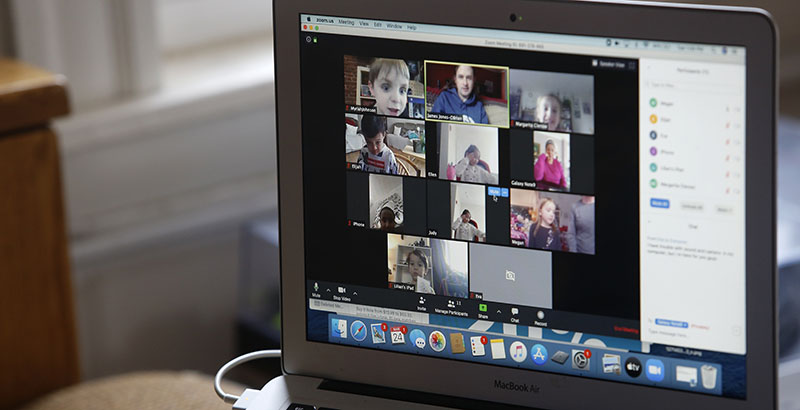Coronavirus Must-Reads for Schools: Pandemic Attendance No-Shows Offer Glimpses of Children Left Behind; Keeping Students Fed and Parents Sane & More

This is a special edition of EduClips, our recurring roundup of top education headlines from America’s 15 largest school districts, where more than 4 million students across 10 states typically attend class every day. See our full EduClips archive right here.
Taking attendance is one of the more quotidian aspects of education, less remarked upon than perennial issues like yawning achievement gaps or the inability to read at grade level. But there’s an obvious causal relationship: Reading mastery can’t develop and gaps don’t shrink if students fail to show up. Long before the pandemic, experts deemed chronic absenteeism a crisis, with nearly 8 million K-12 students missing 15 or more days of school a year.
That was before. Now, the blitzkrieg pace of the switch to remote learning brought about by COVID-19 has led to many more students dropping out, not tuning in. As families struggle with health and economic concerns, not to mention lack of Wi-Fi, some teachers are reporting that they can’t reach students by email or phone. Each failed connection is a story of learning lost. Keara Williams told the Los Angeles Times that two-thirds of the juniors in the Advanced Placement English class at her South L.A. high school had not responded to messages about assignments she’d sent three weeks prior — part of the 7 percent of students the district had not made contact with since schools there closed March 16. Patrick Hawkins, a special education teacher in Atlanta, told the Huffington Post that after three weeks, he still had not heard from two of his elementary students.
In the world of attendance, those are the known unknowns, to paraphrase former defense secretary Donald Rumsfeld. But some systems, like the District of Columbia Public Schools, have completely ceased taking public attendance, and in others, like the Charlotte-Mecklenburg School District in North Carolina, remote learning is optional and teachers are therefore not required to check in with students. It goes without saying, but districts were unprepared to handle a disaster of this scale: American schools have lived through hurricanes and wildfires but nothing that encompassed the entire country or lasted so long. “It’s like a hurricane hit every district in America at the same time,” said Marc Porter Magee, president of the education advocacy group 50Can.
For educators, it’s not too early to prepare for the effects of the cataclysm on the nation’s most vulnerable students. Mike Petrilli, president of the Thomas B. Fordham Institute, has already unveiled a controversial proposal to keep struggling students in their current grades once the pandemic ends. That could spark pushback from parents. A recent Gallup poll found that 48 percent of parents say that students who complete a formal distance learning program should advance to the next grade come fall, but roughly a quarter say that students should advance regardless. Michael Casserly, executive director of the Council of the Great City Schools, told The New York Times that the dilemma of how to catch children up academically once the pandemic fades is “a serious issue that could have implications for years.” “Many skills build one on another,” he said. “If a child misses out on some key idea, then all of a sudden, additional ideas as they’re introduced just become Greek.”
Top stories
Immigrant Students — Miami-Dade Schools Got Ahead on Online Classes, but Immigrant Students Were Left Behind (Read at the Miami Herald)
Student Meals — Free School Lunch Programs Forced to Choose: Fight Coronavirus or Students’ Hunger (Read at USA Today)
Virtual Charters — Competitors or Collaborators: Some School Closure Orders Look to Restrict Virtual Charters to Protect Brick-and-Mortar Schools During Coronavirus Crisis (Read at The74Million.org)
Teacher Shortage — Coronavirus School Closures Push Out Student Teachers. Will US Teacher Shortage Get Worse? (Read at the Louisville Courier Journal)
Undocumented Students — For Undocumented Students, Coronavirus Pandemic Brings Learning Disruptions — and Economic Panic — With Few Avenues for Help (Read at The74Million.org)
‘Social distance’ learning
Analysis: How 18 Top Charter School Networks Are Adapting to Online Education, and What Other Schools Can Learn From Them (Read at The74Million.org)
An Unexpected Tool for Remote Learning During Coronavirus: Public TV Stations (Read at Education Week)
Now More Than Ever, Houston’s ‘Digital Divide’ Puts Children’s Education in Peril (Read at The Houston Chronicle)
Being Kind Online Takes On New Urgency as Socially Isolated Kids and Teens Find It’s Their Only Destination (Read at The74Million.org)
Parents and families
How NYC Parents Are Working to Keep Their Kids Socializing (Read at The City)
Give Yourself ‘Grace’ — and 7 Other Tips From Teachers to Home-Schooling Families (Read at Chalkbeat)
‘Why Do I Want Digital Experiences for My Kids If It Looks Like This?’ — Experts Fear Parent Backlash Against Online Learning (Read at The74Million.org)
Child Care in a Locked-Down World (Read at EdSource)
How Much Home Teaching Is Too Much? Schools Differ in Demands on Parents (Read at Education Week)
Educators
Educators We’ve Lost to the Coronavirus (Read at Education Week)
Teachers Should Seize This Moment to Connect With Their Students (Read at EdSource)
COVID-19: Local Educators Miss Teaching Their Students While Schools Are Shut Down (Read at KHQA)
How Schools Will Overcome the ‘Coronavirus Slide’: Ideas From 5 Superintendents (Read at Education Week)
‘A Tremendous Loss’: Brooklyn Third-Grade Teacher Dies From Coronavirus (Read at Chalkbeat)
Special education
DeVos Weighs Waiving Special Education. Parents Are Worried. (Read at The New York Times)
‘It’s Exhausting’: Illinois Special Needs Parents Struggle With Remote Learning Days (Read at Illinois Newsroom)
How Children With Disabilities Are Getting Left Behind (Read at HuffPost)
Disability Rights Groups, School Administrators Spar Over Possible Changes to Special Education Laws (Read at EdSource)
Equity and activism
Children May Miss Meals as School Food Service Workers Fall Ill (Read at NPR)
For Schools, a New Challenge: How to Feed Students During Spring Break? (Read at The Washington Post)
Essays and reflections
It’s Hard to Teach Writing Online: A Veteran Educator’s Tips for Reaching Students Remotely (Read at The Atlantic)
Pondiscio: At This Time of Crisis, Schools Are Improvising, Innovating and Scaling Good Ideas With Love, Loyalty & Care. These Days Will Shape Us Forever (Read at The74Million.org)
Oregon’s Coronavirus Education Lockdown: Teachers Unions Block Kids From Transferring to Virtual Charter Schools (Read at The Wall Street Journal)
The Dying Art of Instruction in the Digital Classroom (Read at The New York Review of Books)
Bradford: $13B in Stimulus Money for K-12 Schools Is a Good Start. But All Types of Schools Will Need More Help From the Feds in Order to Reopen (Read at The74Million.org)
QuotED
“It’s like a hurricane hit every district in America at the same time.” —Marc Porter Magee, president of the education advocacy group 50Can. (Read at the Huffington Post)
“I actually need my teachers, who know me and understand me, to help me, and I don’t have that. I just keep thinking, ‘Oh, my God, I might not pass.’ I’m just really scared for the future.” —Titilayo Aluko, 18, a junior at Landmark High School in Manhattan. (Read at The New York Times)
“I’d give it about a month.” —Miriam, an undocumented high school student in San Anonio, Texas, on the economic urgency facing her family during the pandemic. (Read at The74Million.org)
“I miss my kids. I miss them so much. I just want to … I want to help them. I want to teach them. I think I’m getting a little emotional. I wish I was in a class and I wish I had my whiteboard and my marker and I wish I had all of them in one room because it is not easy. OK, so. Whew, all right. Should we move on?” —Keara Williams, teacher at a South Los Angeles high school. (Read at the Los Angeles Times)
“We’re built for challenging times. Children don’t have the words today to describe it, but the lessons of the pandemic will become clearer in the retelling. It’s about social cohesion, love and loyalty, and how good people step up when we need them to.” —Robert Pondiscio, senior fellow at the Thomas B. Fordham Institute. (Read at The74Million.org)
Get stories like these delivered straight to your inbox. Sign up for The 74 Newsletter

;)
